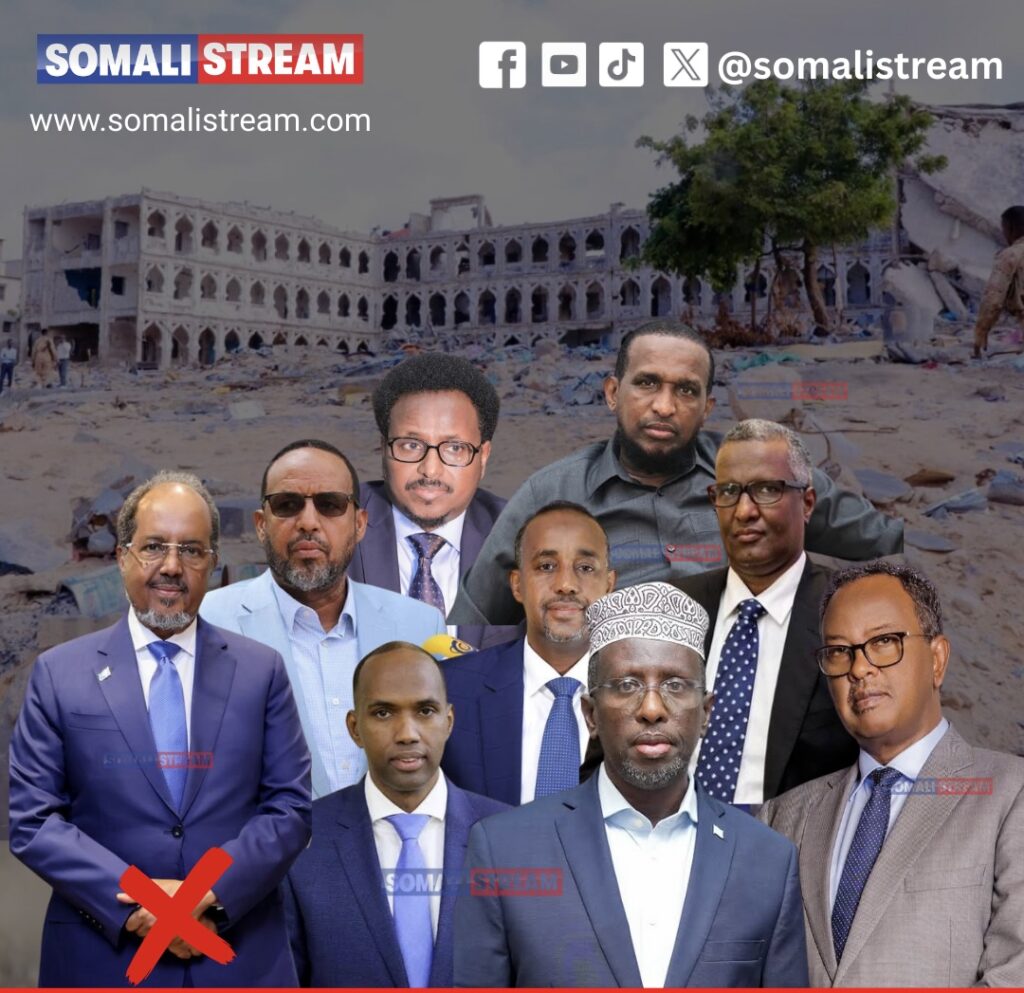In the heart of Somali capital, Mogadishu, a city reeling from over three decades of war, displacement, and institutional collapse; a new kind of conflict has taken root, one not waged by guns, but by Villa Somalia sent bulldozers.
As the second term of President Hassan Sheikh Mohamud nears its turbulent end, public outcry over widespread land seizures has ignited a political firestorm that now threatens to reshape Somalia’s governance; or shatter what little public trust remains.
Three years after his return to Villa Somalia, the same man who once vowed to rebuild a shattered nation is now accused of tearing it apart, not just metaphorically, but literally, neighborhood by neighborhood right from the heartbeat of the nation, Mogadishu.
A Presidency plagued by history, haunted by the present
During his first term in office (2012–2016), President Hassan Sheikh was dogged by reports of rampant corruption. These weren’t whispers in diplomatic corridors or leaked memos; they were shouted from the chamber floors of Parliament, coffee huts, and the streets of Mogadishu, Garowe, Baidoa and Kismayo. Foreign aid vanished without trace. Public offices were auctioned like cattle. Parliamentarians likened the looting of state institutions to a “locust invasion”; devouring everything in its path, leaving only despair.
His presidency ended in humiliation, ousted in early 2017 elections by a Parliament that had grown tired of the mismanagement and patronage. Many thought that would be the end of his political career. But Somali politics rarely follows a straight line.
In 2022, Hassan Sheikh returned to power; older, perhaps wiser, but unmistakably determined. What followed, critics now argue, was not a redemption arc, but an upgraded wave of plunder.
The new controversy is as visible as it is volatile: the alleged illegal sale and privatization of public land across Mogadishu. Every parcel of land, has become a target in a new wave of scramble for Mogadishu by the Presidency and its cronies.
State-owned land – schools, hospitals, public squares, and entire blocks of historic neighborhoods has reportedly been parceled out to private developers with links to powerful figures in the presidency. In the process, hundreds of families have been violently displaced.
In a city already choking under the weight of over one million internally displaced persons (IDPs); victims of conflict, floods, and Al-Shabaab; a new category of victims has emerged: the “HSDPs” or in full, Hassan Sheikh Displaced Persons. Imagine being forced to flee Al-Shabaab only to be bulldozed by your own government?
The Forum for Salvation: A Voice for the Voiceless?
Into this moral vacuum stepped the Forum for the Salvation of Somalia, an opposition coalition of former Prime Ministers, Presidents, Ministers, and activists now acting as the de facto conscience of the nation.
Formed to challenge the abuse of executive power, the ‘Madasha Samatabixinta’ Forum has unexpectedly evolved into the only body capable of halting the presidential machine. Their intervention, sparked by violence in the Siinaay neighborhood on September 24, 2025, stopped what many thought was an unstoppable land grab.
After videos of civilians being beaten, homes razed, and elderly women dragged from their homes went viral, the Forum called for mass public demonstrations. What followed was extraordinary: for the first time in three years, the Presidency blinked. Bulldozers stopped. Negotiations were promised. The protests were postponed. For many, this was not just a tactical pause, it was a moment of hope.
In theory, Somalia has democratic institutions meant to check executive power. In practice, many members of Parliament have become complicit, with several lawmakers themselves implicated in land deals. Some of them have become real estate agents scouting for the next piece of land to auction, instead of legislating the next piece of laws. Others have used their recent parliamentary recess to negotiate land deals or even at some point, serve as construction supervisors. They swapped their parliamentary role for that of an auctioneer, betraying the Somali people they swore to defend.
With no functioning legal accountability mechanism; no independent judiciary, no empowered ombudsman, the Forum has assumed an unofficial but critical role: defending the constitution, the land, and the people.
But this makes them a target. Their offices have been raided. Their leaders harassed, with even one bodyguard losing his life. Their families threatened. Still, they press on.
Somalia’s 34-year descent into lawlessness has cultivated a political culture where corruption is not scandalous – it is structural. From warlords to technocrats, successive regimes have operated under a grim understanding: there is power in impunity, and profit in public theft.
But this time, the theft is not hidden in offshore accounts. It is not buried in aid budgets or disguised in contracts. It is concrete, visible, and cruel, schools turned into shopping malls, parks converted to luxury villas, public land flipped for private gain while citizens sleep in tents.
The fight in Mogadishu is not just about real estate. It’s about whether public interest can survive a predatory state.
Will the Bulldozers Return?
For now, the Forum has bought the public time, but not victory. The Presidential Office has not declared a formal halt to land sales. No accountability has been initiated. No restitution offered to the displaced.
But something has shifted. Fear is now met with resistance. Silence with speeches. Bulldozers with protests.
The Salvation Forum’s challenge to the Presidency is not just political, it is viewed as moral. It is a test of whether a government born from the ashes of civil war can serve its people without exploiting them.
What comes next?
As elections approach and the political elite jockey for power, the stakes are no longer just about who will govern Somalia – but how? Will the next government inherit a system built on land theft and corruption? Or can this moment spark a national reckoning? The Forum for the Salvation of Somalia has cracked the wall. Now, the question is whether they and the people can bring it down. Until then, the displaced wait, the land lies barren, and a nation once again holds its breath.


